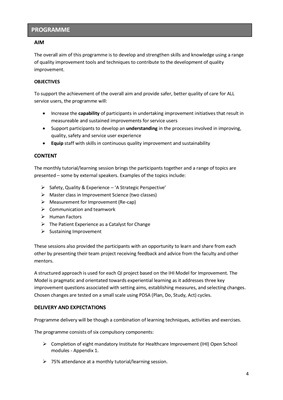
4
AIM
The overall aim of this programme is to develop and strengthen skills and knowledge using a range
of quality improvement tools and techniques to contribute to the development of quality
improvement.
OBJECTIVES
To support the achievement of the overall aim and provide safer, better quality of care for ALL
service users, the programme will:
Increase the capability of participants in undertaking improvement initiatives that result in
measureable and sustained improvements for service users
Support participants to develop an understanding in the processes involved in improving,
quality, safety and service user experience
Equip staff with skills in continuous quality improvement and sustainability
CONTENT
The monthly tutorial/learning session brings the participants together and a range of topics are
presented - some by external speakers. Examples of the topics include:
Safety, Quality & Experience - 'A Strategic Perspective'
Master class in Improvement Science (two classes)
Measurement for Improvement (Re-cap)
Communication and teamwork
Human Factors
The Patient Experience as a Catalyst for Change
Sustaining Improvement
These sessions also provided the participants with an opportunity to learn and share from each
other by presenting their team project receiving feedback and advice from the faculty and other
mentors.
A structured approach is used for each QI project based on the IHI Model for Improvement. The
Model is pragmatic and orientated towards experiential learning as it addresses three key
improvement questions associated with setting aims, establishing measures, and selecting changes.
Chosen changes are tested on a small scale using PDSA (Plan, Do, Study, Act) cycles.
DELIVERY AND EXPECTATIONS
Programme delivery will be though a combination of learning techniques, activities and exercises.
The programme consists of six compulsory components:
Completion of eight mandatory Institute for Healthcare Improvement (IHI) Open School
modules - Appendix 1.
75% attendance at a monthly tutorial/learning session.
PROGRAMME